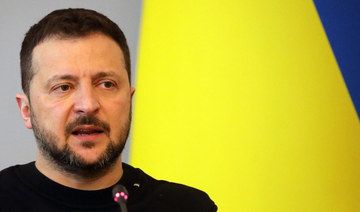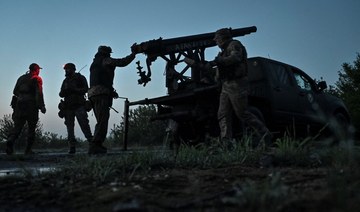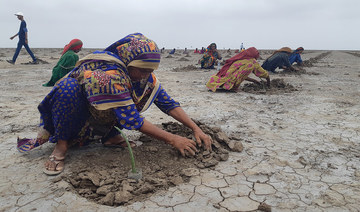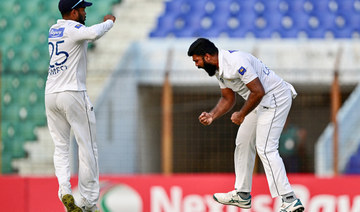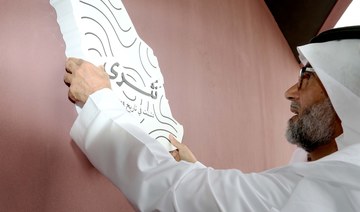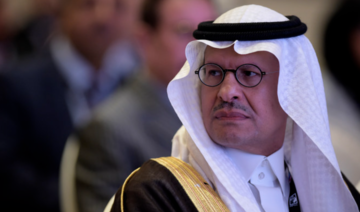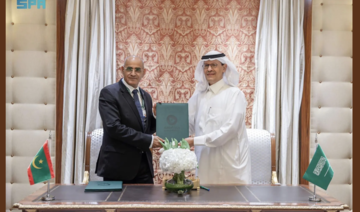TORONTO: Canadian voters emphatically reclaimed their country’s liberal identity, putting Justin Trudeau, the youthful son of one of the country’s most dynamic politicians, in the prime minister’s office, and ending 10 years of leadership by Stephen Harper, whose dream was to recast Canada as a more conservative country.
The victory in Monday’s election by Trudeau’s Liberal Party was stunning. The Liberals were on a path to win at least 184 seats out of 338 — a parliamentary majority that will allow Trudeau to govern without relying on other parties. Harper’s Conservatives were winning 100. The Liberals received 39.5 percent of the overall vote compared to 32 percent for the Conservatives and 19.6 for the New Democrats.
Harper, one of the longest-serving Western leaders, will step down as Conservative leader, the party announced as the scope of its loss became apparent.
Trudeau’s victory could result in improved ties with the United States, at least for the remainder of Barack Obama’s presidency. Harper was frustrated by Obama’s reluctance to approve the Keystone XL pipeline from Alberta to Texas and clashed with the president on other issues, including the Iran nuclear deal. Although Trudeau supports the Keystone pipeline, he argues relations should not hinge on the project.
Trudeau is the son of the late Prime Minister Pierre Trudeau, who swept to office in 1968 on a wave of support dubbed “Trudeaumania.” He was prime minister until 1984 with a short interruption and remains one of the few Canadian politicians known in America, his charisma often drawing comparisons to John F. Kennedy.
Trudeau channels the star power — if not quite the political heft — of his father. Tall and trim, he is a former school teacher and member of Parliament since 2008. At 43, he becomes the second youngest prime minister in Canadian history and has been likened to Obama.
“Tonight Canada is becoming the country it was before,” Trudeau told a victory rally in Montreal.
Trudeau has re-energized the Liberal Party since its worst electoral defeat four years ago when they won just 34 seats and finished third behind the traditionally weaker New Democrat Party. Trudeau promises to raise taxes on the rich and run deficits for three years to boost government spending. He said positive politics led to his victory.
“We beat fear with hope,” Trudeau said. “We beat cynicism with hard work. We beat negative, divisive politics with a positive vision that brings Canadians together. Most of all we defeated the idea that Canadians should be satisfied with less.”
Canada shifted to the center-right under Harper, who lowered sales and corporate taxes, avoided climate change legislation, and strongly supported the oil and gas extraction industry.
“The people are never wrong,” Harper told supporters in Calgary. “The disappointment is my responsibility and mine alone.”
Harper said he had called Trudeau to congratulate him.
Trudeau’s opponents pilloried him as too inexperienced, but Trudeau embraced his boyish image on Election Day. Sporting jeans and a varsity letter jacket, he posed for a photo standing on the thighs of two his colleagues to make a cheerleading pyramid, his campaign plane in the backdrop with “Trudeau 2015” painted in large red letters.
“A sea of change here. We are used to high tides in Atlantic Canada. This is not what we hoped for,” said Peter MacKay, a former senior Conservative cabinet minister, shortly after polls closed in Atlantic Canada.
Harper, 56, visited districts he won in the 2011 election in an attempt to hang onto them. On Saturday, he posed with Toronto’s former crack-smoking mayor, Rob Ford, in a conservative suburb.
Former colleagues of Harper said he would be personally devastated to lose to a Trudeau, the liberal legacy he entered politics to destroy. Harper’s long-term goal was to kill the widely entrenched notion that the Liberals — the party of Pierre Trudeau and Jean Chretien — are the natural party of government in Canada, and to redefine what it means to be Canadian.
Hurt when Canada entered a mild recession earlier this year, Harper made a controversy over the Islamic face veil a focus of his campaign, a decision his opponents seized on to depict him as a divisive leader.
“Canadians rejected the politics of fear and division,” New Democrat leader Tom Mulcair said of Harper’s Conservatives.
Nelson Wiseman, a political science professor at the University of Toronto, said Canadians rallied around the Liberals as the anti-Harper vote.
“It became not only a referendum on Mr. Harper but really a sweep for Mr. Trudeau as well,” said Antonia Maioni, a political science professor at McGill University.
“A clash of values pushed Canadians to really think about what they wanted from a government and what kind of image they wanted reflected back from that government and I think that’s where Mr. Trudeau’s optimism and hope and idea of change captured people’s imagination.”
The New Democrats suffered a crushing defeat, falling to third place with 43 seats after winning official opposition status in the last election.
“I congratulated Mr. Trudeau on his exceptional achievement,” Mulcair said at a rally in Montreal.
Paula Mcelhinney, 52, from Toronto, voted Liberal to get rid of Harper.
“I want to get him out, it’s about time we have a new leader. It’s time for a change,” she said.
Son of late PM Pierre Trudeau becomes Canada’s new leader
Son of late PM Pierre Trudeau becomes Canada’s new leader
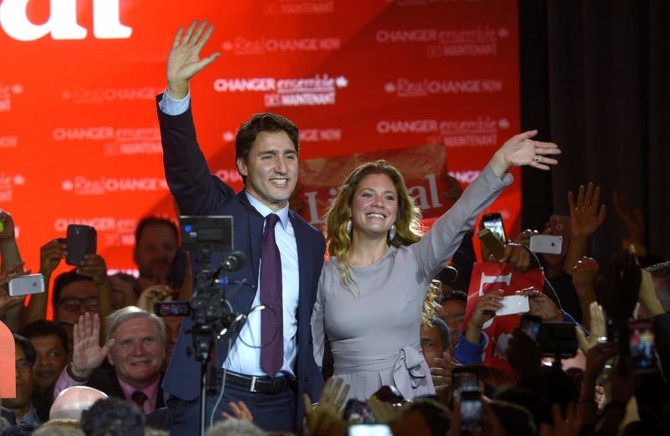
King Charles III resumes public duties as he fights cancer
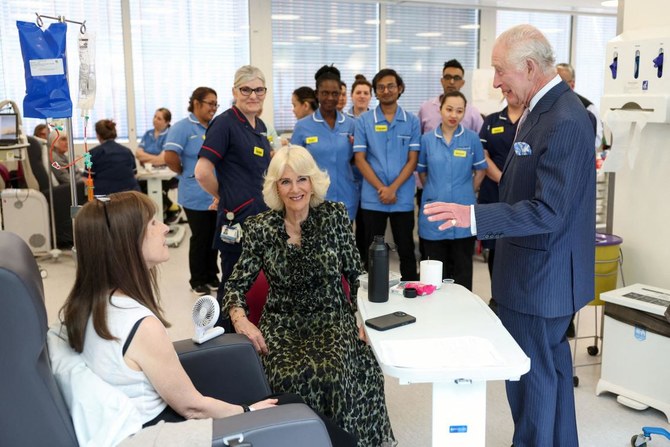
He talked to patients receiving chemotherapy at a day unit
LONDON: King Charles III on Tuesday reportedly told fellow cancer patients “I’m well,” as he carried out his first official public engagement since being diagnosed with the condition.
The British head of state appeared relaxed as he and his wife Queen Camilla met patients and staff at the University College Hospital Macmillan Cancer Center in central London.
He talked to patients receiving chemotherapy at a day unit, including 60-year-old Asha Millen, who has bone marrow cancer.
“I said, ‘How are you?’ and he said, ‘I’m well’,” she told reporters afterwards.
Another patient, Lesley Woodbridge, 63, said the king sympathized with her, and added: “I’ve got to have my treatment this afternoon as well.”
Charles, 75, suspended most of his duties in February after cancer was found while he was being treated for an enlarged prostate the previous month.
The exact nature of his cancer has not been disclosed but doctors said last week they were “very encouraged” by the progress of his treatment as an out-patient and “positive” about his recovery.
His daughter-in-law Catherine, Princess of Wales, 42, underwent abdominal surgery in January and said in March that she was receiving chemotherapy.
Again, no details were given about what type of cancer she has. Kate, as she is widely known, is married to Charles’s elder son and heir Prince William.
Tuesday’s event was the first in a number of planned engagements in the coming weeks and designed to raise awareness of the importance of early cancer diagnosis and highlight innovative research, Buckingham Palace said.
Charles, who succeeded his mother Queen Elizabeth II in September 2022, was officially crowned king on May 6 last year.
He has been seen attending church services since his diagnosis and at selected audiences. He has also continued his official state business.
His treatment will continue but his schedule in the coming weeks will be reduced and subject to medical advice, a spokesperson added.
His engagements will include a state visit by Emperor Naruhito and Empress Masako of Japan in June.
The chief executive of University College London Hospitals group, David Probert, said Charles “deliberately went out of his way to meet as many staff and patients as he could.”
Patients were “delighted” to see him, he told Sky News, and described the visit as “incredibly uplifting.”
Members of the public last week welcomed the king’s return to some duties, praising him for raising awareness about cancer, which will affect one in two people, according to Cancer Research UK.
Probert said the king’s announcement had led to a surge in people looking up symptoms and seeking out treatment.
“It’s a huge issue in today’s society,” Keegan Gray, 23, a demolitions manager from New Zealand, told AFP on Friday.
“A lot of people have cancer and a lot of people they keep it to themselves, they’re a bit shy about it,” he added after the news Charles would resume some public duties.
Gray said it was “really beautiful” that the king was raising awareness of cancer and the work of treatment clinics.
Charles and Kate’s cancer diagnoses have created a headache for the royal family, with both having postponed public engagements.
William has also taken a step back to support his wife and their three young children, leaving fewer senior royals to fill the schedule.
Camilla, 76, has stepped in to take over many of her husband’s engagements. Charles’s sister Princess Anne and his youngest brother Prince Edward have also taken on more prominent roles.
Charles’s largely estranged younger son, Prince Harry, is no longer a working royal but is expected in London on May 8 to mark the 10th anniversary of his Invictus Games for disabled military veterans.
He will then join his American wife Meghan on a visit to Nigeria.
Russia says shot down US-made missiles launched by Ukraine
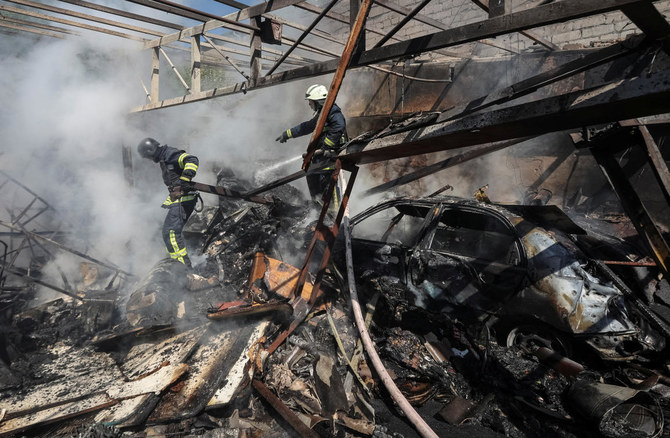
- Washington has said it had supplied the arms to Ukraine
- The Russian-installed head of Crimea, Sergei Aksyonov, said one of the missiles was downed in the village of Donskoye
MOSCOW: Russia said Tuesday it had shot down six US-supplied tactical missiles launched by Ukraine, with officials in annexed Crimea saying some were downed over the Black Sea peninsula.
Washington has said it had supplied the arms to Ukraine, which has been asking for more powerful weapons for months as it struggles to contain advancing Russian forces.
Moscow’s defense ministry said it had destroyed six Army Tactical Missile System (ATACMS) rockets “in the last 24 hours,” without saying where they were shot down.
The Russian-installed head of Crimea, Sergei Aksyonov, said one of the missiles was downed in the village of Donskoye, outside the main city of Simferopol.
“After an ATACMS missile was shot down, undetonated submunitions scattered,” Aksyonov said on Telegram.
“If you find such a weapon, do not pick it up or come close and call emergency services or the police,” he warned.
Aksyonov posted a photograph of a metal ball which he said was part of the destroyed missile.
Russia did not say if the missiles caused any damage in Crimea.
Earlier, an official from Russian-occupied southern Ukraine, Vladimir Rogov, said that air defense had been in operation over Simferopol and the town of Dzankoi, in northern Crimea.
Ukraine has regularly attacked Crimea during Moscow’s more than two-year offensive.
But it did not comment on Tuesday’s attack.
Last week, the United States said it had sent ATACMS missiles to Ukraine in February.
Ukrainian forces are now awaiting the arrival of new US weapons, green-lighted by President Joe Biden after months of being blocked by political wrangling in Congress.
Sri Lanka joins Global South-North dialogue through Riyadh WEF meeting
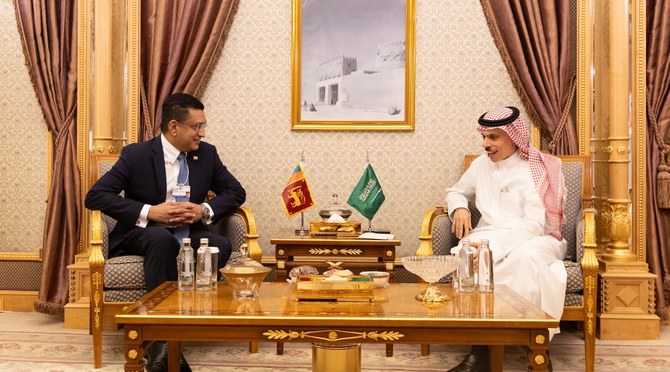
- Foreign Minister Ali Sabry was among the special meeting’s speakers
- He represented the Global South perspective at the invitation of Saudi FM
COLOMBO: Sri Lanka is trying to position itself in the dialogue between the Global South and North, its foreign minister said, following the World Economic Forum’s special meeting on global collaboration organized by Saudi Arabia.
The WEF’s Special Meeting on Global Collaboration, Growth and Energy for Development convened 1,000 global leaders arriving in Riyadh from 92 countries on April 28-29 to find actionable, collaborative and sustainable solutions to shared challenges.
The meeting saw a focus on the Global South, or countries, mostly in the Southern Hemisphere and largely in Africa, Asia and Latin America, which until recently have often been described as developing or less developed.
Sri Lanka FM Ali Sabry represented the Global South perspective at the forum’s session titled “North to South, East to West: Rebuilding Trust” alongside his Saudi counterpart, Prince Faisal bin Farhan.
“It was a great opportunity for me to showcase Sri Lanka and the challenges that countries in the Global South face, and also to position Sri Lanka as an important player, particularly in the Global South in shaping the future … for collaboration, peace and stability, rather than confrontation,” he told Arab News.
The minister was in Riyadh at the invitation of Prince Faisal, with whom he also held a meeting.
“We look forward to elevating the partnership,” Sabry said.
“We intend to sign the investment protection agreement that would probably pave the way for the inflow of investment into Sri Lanka.”
He also met other Saudi leaders during his visit to explore further cooperation possibilities.
The Kingdom has expanded ties with the South Asian island nation since last year, agreeing to broaden political consultation and launching a new employment scheme aimed at boosting Sri Lanka’s manpower exports.
Colombo has since sought Saudi assistance in developing several of its key sectors, including tourism and agriculture.
Saudi Hajj minister in Jakarta as Indonesia prepares record number of pilgrims
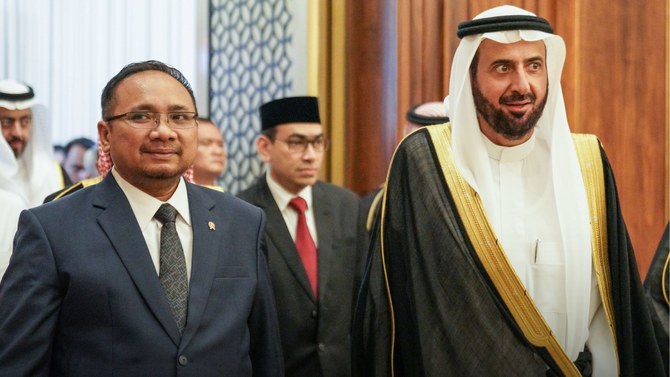
- 241,000 Indonesian pilgrims are set to perform the Hajj this year
- Saudi minister will launch tourism exhibit in Jakarta on Wednesday
JAKARTA: Saudi Arabia’s Hajj and Umrah Minister Tawfiq Al-Rabiah held meetings in Jakarta on Tuesday to coordinate pilgrimage preparations as Indonesia is going to send its largest-ever Hajj contingent this year.
The Kingdom has approved the 2024 quota of 241,000 Indonesian pilgrims, an increase of 20,000 from last year.
Al-Rabiah held discussions with Indonesia’s Religious Affairs Minister Yaqut Cholil Qoumas on ways to streamline Hajj services for the Asian nation’s pilgrims.
“I just had a long and productive meeting and discussion with my brother, the Indonesian religious affairs minister, which was focused on giving the best services and ease for Hajj and Umrah pilgrims from Indonesia,” Al-Rabiah said during a press conference.
“The Saudi government has revitalized historical and Islamic sites in Makkah and Madinah, and other sites related to pilgrimage and the journey of Prophet Muhammad … and we invite all pilgrims to come and visit these sites.”
Indonesia’s higher quota will help shorten the wait for some pilgrims by a few years, which is especially important for the elderly in the Southeast Asian nation. Many in the country wait up to 45 years for their turn, according to official estimates.
Qoumas said his interactions with Al-Rabiah had been meaningful.
“Maybe we can consider Indonesia as having received a special treatment from the Saudi government, as we are welcoming a big delegation led directly by the Saudi Hajj and Umrah minister, who are here to ensure that Indonesian Hajj pilgrims this year will get the best services from the Kingdom of Saudi Arabia,” Qoumas said.
“As a representative of the Indonesian government, we feel very grateful and thankful.”
Al-Rabiah is scheduled to inaugurate on Wednesday a Saudi Tourism Authority event showcasing the variety of travel destinations the Kingdom has to offer as it aims to attract more international visitors under Vision 2030.
Germany failing to protect Muslims from hate: Human Rights Watch
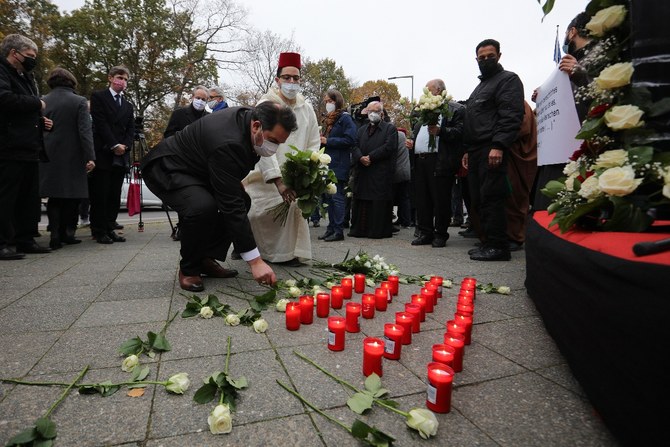
- Government ‘lacks understanding’ of racism targeting Muslim communities
- 2023 marked ‘frighteningly new high’ for hate incidents: German NGO chief
LONDON:Germany is failing to protect Muslims from growing racism amid a “lack of understanding” about the issue, Human Rights Watch has warned.
The country has yet to implement a working definition of anti-Muslim racism and frequently fails to record data on race-hate incidents, the organization said on Tuesday.
A key failing of the German government concerns its “lack of understanding that Muslims experience racism and not simply faith-based hostility,” said Almaz Teffera, a HRW researcher on racism in Europe.
“Without a clear understanding of anti-Muslim hate and discrimination in Germany, and strong data on incidents and community outreach, a response by the German authorities will be ineffective.”
Germany recorded 610 “anti-Islamic” crimes in 2022, but from the start of 2023 to September that year, the number had climbed to 686.
There are fears that the figure has further surged since the outbreak of the Gaza conflict last October.
Germany’s Interior Ministry told HRW that it could not provide data on anti-Muslim crimes from October 2023 to the year-end.
However, civil society groups in the country recorded a spike in reported incidents, leading Germany’s federal commissioner for anti-racism, Reem Alabali-Radovan, to join an EU-wide expression of concern about the rise in hate.
The Alliance Against Islamophobia and Anti-Muslim Hate, a German NGO network, documented “an average of three anti-Muslim incidents a day” last November.
The network’s chief, Rima Hanano, told HRW that “2023 marked a frighteningly new high for anti-Muslim incidents.”
Though the network collects its own internal data on the frequency of hate incidents, the German government “has yet to develop an infrastructure for countrywide monitoring and data collection,” HRW said.
The government has also classified hate incidents against Muslims as “anti-Islamic” since 2017, removing nuances surrounding the ethnic identities of victims, HRW added.
A three-year study commissioned by the government and published last year recommended that authorities “no longer dissociate anti-Muslim hate from racism,” but instead “recognize their connection.”
However, the Interior Ministry has failed to carry out the report’s recommendations, HRW said, adding: “Any focus on anti-Muslim hate and discrimination that fails to include racism or acknowledge the intersectional nature of such hostility will be unable to capture the full picture or inform effective policy responses.”
Muslim communities in Germany are a “group with a diversity of ethnicities” rather than a “monolithic religious group,” said Teffera.
“Germany should invest in protecting Muslims and all other minority communities in Germany because it is an investment in protecting all of German society.”


